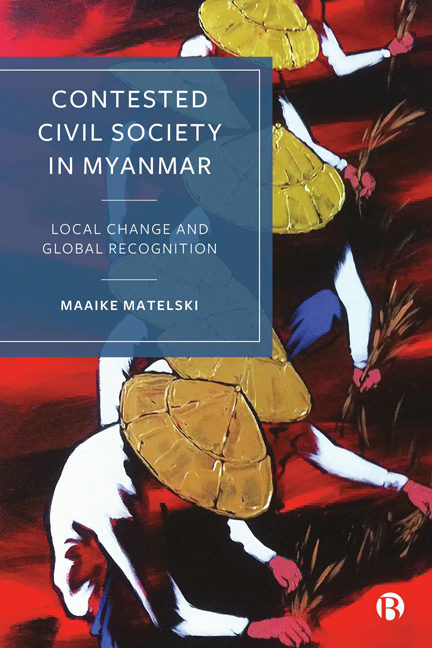Book contents
- Frontmatter
- Contents
- List of Abbreviations and Acronyms
- Acknowledgements
- Introduction: Contested Representation in Burma/Myanmar
- 1 Conflict, Repression and Resistance from Colonialism to Military Rule
- 2 Constructing Civil Society in Myanmar
- 3 Diversity and Fault Lines in Burmese Civil Society
- 4 Room to Manoeuvre under Authoritarian Rule
- 5 Transnational Advocacy Strategies and Pathways to Change
- 6 Competing Frames around the 2010 Elections
- 7 Foreign Aid and the (De)politicization of Civil Society Assistance
- 8 Interrupted Transition and Post-coup Resistance
- Conclusion
- Notes
- References
- Index
8 - Interrupted Transition and Post-coup Resistance
Published online by Cambridge University Press: 28 March 2024
- Frontmatter
- Contents
- List of Abbreviations and Acronyms
- Acknowledgements
- Introduction: Contested Representation in Burma/Myanmar
- 1 Conflict, Repression and Resistance from Colonialism to Military Rule
- 2 Constructing Civil Society in Myanmar
- 3 Diversity and Fault Lines in Burmese Civil Society
- 4 Room to Manoeuvre under Authoritarian Rule
- 5 Transnational Advocacy Strategies and Pathways to Change
- 6 Competing Frames around the 2010 Elections
- 7 Foreign Aid and the (De)politicization of Civil Society Assistance
- 8 Interrupted Transition and Post-coup Resistance
- Conclusion
- Notes
- References
- Index
Summary
After five years of contentious rule, Aung San Suu Kyi’s National League for Democracy (NLD) party secured its largest victory to date in the elections of November 2020. The military alleged voter fraud, despite widespread evidence to the contrary, and put pressure on the Union Election Commission (UEC) to hold off with the formation of a new government. When it became clear that the new parliament would convene as planned, Commander-in-Chief Min Aung Hlaing staged a coup on the morning of 1 February 2021. The military took control of parliament in Naypyidaw, imprisoned Aung San Suu Kyi, President Win Myint and other elected NLD leaders, and took over all powers under the name of the State Administration Council (SAC). The SAC appointed its own ministers as well as a new UEC, which subsequently confirmed mass voter fraud and cancelled the election results (Reny, 2022).
The 2021 military coup was a major setback in the transition process and a big surprise to the international community, which had largely underestimated the continued role of the military in Myanmar politics. The move was less surprising to local observers, as the military had been raising doubts about the election process and the role of the NLD-appointed UEC since mid-2020. In the months after the elections, at least 45 demonstrations were held protesting against presumed electoral fraud, mostly organized by the Union Solidarity and Development Party (USDP), which reportedly paid participants to demonstrate (Bynum, 2021). Although the 2008 constitution contains a provision for a military coup, the 2021 coup was widely considered to contravene that provision. Min Aung Hlaing would have been forced to retire as head of the military in June 2021 and had likely hoped to become president. The NLD’s electoral victory deprived him of that opportunity and also posed a risk to the many military-controlled enterprises. The increasing number of international prosecutions of human rights violations involving the military probably also made its leadership less confident of a secure future (Jordt et al, 2021: 4).
The military initially seemed set on organizing elections mid-2023 in an effort to establish a legal basis for continued SAC rule. However, in early 2023 it extended the nationwide state of emergency without mentioning a new date for the election, which constitutionally should be held within six months after termination of a state of emergency (International Crisis Group, 2023b).
- Type
- Chapter
- Information
- Contested Civil Society in MyanmarLocal Change and Global Recognition, pp. 136 - 156Publisher: Bristol University PressPrint publication year: 2023



